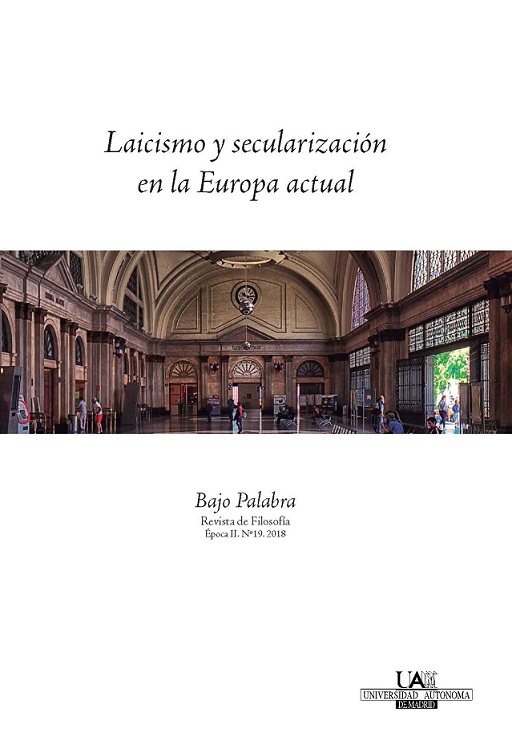Abstract
The Book of Revelation is one of the most influential texts in the Western history. This paper reviews its social and cultural validity and points out some strands of the tradition that it boosted. From this point of view, the importance of time control through storytelling will be studied.
Keywords: end, revelation, history, time.
Downloads
References
Dale C. Allison, The end of the ages has come. An early interpretation of the passion and resurrection of Jesus, Wipf and Stock, Eugene, 1985.
Dale C. Allison, Jesus of Nazareth: millenarian prophet, Fortress Press, Minneapolis, 1998.
Dale C. Allison, The historical Christ and the theological Jesus, Erdmans, Michigan, 2009.
Jan Assmann, Herrschaft und Heil. Politische Theologie in Altägypten, Israel und Europa, Fischer Verlag, Frankfurt 2002 (traducción en Abada editores: Poder y salvación).
Jan Assmann, Das kulturelle Gedächtnis. Schrift, Erinnerung und politische Identität in frühen Hochkulturen, Verlag C. H. Beck, München, 1992.
Jan Assmann, Moisés el egipcio, Oberón, Madrid, 2003.
Jan Assmann, Egipto. Historia de un sentido, Abada, Madrid, 2005.
Jan Assmann, La distinción mosaica. O el precio del monoteísmo, Akal, Madrid, 2006.
Jan Assmann, Religión y memoria cultural. Diez estudios, Lilmod Ediciones, Buenos Aires, 2008.
Jan Assmann, Violencia y monoteísmo, Fragmenta Editorial, Barcelona, 2014
Jan Assmann, Exodus. Die Revolution der Alten Welt, C. H. Beck Verlag, München, 2015.
Eduardo Arens y Manuel Díaz Mateos, Apocalipsis. La fuerza de la esperanza, CEP, Lima, 2000.
Juan Barja y Patxi Lanceros, Pasos. Los espacios del nómada, Abada editores, Madrid, 2016.
Malcom Bull (ed.), Apocalypse theory and the ends of the world, Blackwell, Oxford, 1995.
Pierre Chantraine, Dicctionaire éthymologique de la langue grecque, Klincksieck, París, 1999.
John J. Collins, Apocalypse: the morphology of a genre (Semeia 14), Society of Biblical Literature, 1979.
Félix Duque, Filosofía para el fin de los tiempos, Akal, Madrid, 2000.
Alfred Ernout y Antoine Meillet, Dictionnaire etymologique de la langue latine. Histoire des mots, Klincksieck, Paris, 1959.
Leon Festinger, Henry W. Riecken y Stanley Schachter, When profecy fails. A social and psychological study of a modern group that predicted the destruction of the world, Harper & Row, Nueva York, 2009 (original de 1956).
Hjialmar Frisk, Griechisches Etymologisches Wörterbuch, Carl Winter Universitäsverlag, Heidelberg, 1970.
Jhon G. Gager, Kingdom and community. The social world of early christianity, Prentice Hall, New Jersey, 1975.
John G. Gager, Who made christianity?: the jewish lives of the apostle Paul, Columbia University Press, Nueva York, 2015.
Paul D. Hanson, The down of apocalyptic. The historical and sociological roots of Jewish apocaliptic escatology, Fortress Press, Minneapolis, 1979.
Paul D. Hanson, Old Testament apocaliptic, Abingdon Press, Nashville, 1987.
Paul D. Hanson, Political engagement as biblical mandate, Cascade Books, Eugene, 2010.
David Hellholm (ed.), Apocalypticism in the Mediterranean world and the near est, J.C.B. Mohr (Paul Siebeck), Tübingen, 1983.
Richard A. Horsley and John S. Hanson, Bandits, prohets and messiahs: popular movements in the time of Jesus, Trinity Press, Harrisburg, 1985.
Richard A. Horsley, Jesus and the spiral of violence. Popular jewish resistence in roman Palestine, Fortress Press, Minneapolis, 1993.
Richard A. Horsley, Revolt of the Scribes. Resistence and apocalyptic origins, Fortress Press, Minneapolis, 2010.
Frank Kermode, El sentido de un final. Estudios sobre la teoría de la ficción, Gedisa, Barcelona, 2000.
Wayne A. Meeks, In search of the early christians. Selected essays, Yale University Press, New Haven, 2002.
Wayne A. Meeks, Los primeros cristianos urbanos. El mundo social del apóstol Pablo, Ediciones Sígueme, Salamanca, 2012.
John P. Meier, Un judío marginal. Nueva visión del Jesús histórico, Verbo Divino, Estella, 1998 (4 vols.).
Elaine H. Pagels, Revelations: visions, prophecy and politics in the Book of Revelation, Penguin, Nueva York, 2012.
Anathea Portier-Young, Apocalipsis contra imperio. Teologías de resistencia en el judaísmo antiguo, Verbo Divino, Estella, 2016.
Emil Schürer, Historia del pueblo judío en tiempos de Jesús, Ediciones Cristiandad, Madrid, 1985 (2 vols.).
Elisabeth Schüssler Fiorenza, Apocalipsis. La visión de un mundo justo, Verbo Divino, Estella, 2010.
Santiago Segura, Nuevo diccionario etimológico latín-español y de las voces derivadas, Universidad de Deusto, Bilbao, 2013.
Peter Sloterdijk, Gottes Eifer. Vom Kampf der drei Monotheismen, Suhrkamp, Frankfurt, 2007.
Peter Sloterdijk, Im Schatten des Sinai, Suhrkamp, Frankfurt, 2013.
Philipp Vielhauer, Historia de la literatura cristiana primitiva, Sígueme, Salamanca, 1991.
Gerhard von Rad, Der Heilige Krieg im alten Israel, Vanderhoeck & Ruprecht, Göttingen, 1958.
Robert Louis Wilken, The christians as the romans saw them, Yale University Press, New Haven, 1984.
Adela Yarbro Collins, The combat myth in the Book of Revelation, Wipf and Stock, Eugene, 1976.
Adela Yarbro Collins (ed.), Early christian apocalypticism: genre and social settings (Semeia 36), Society of Biblical Literature, 1986.
